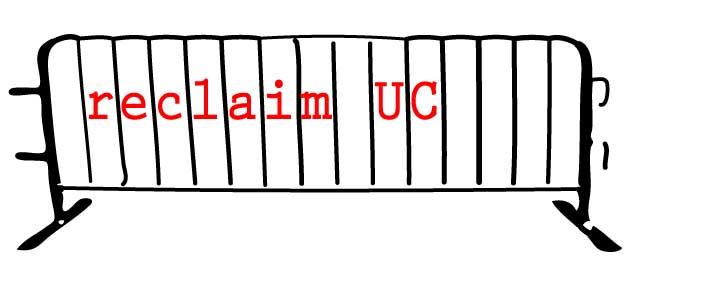
Charlie Schwartz is back with a bunch of new data documenting the astronomical growth of the administrative apparatus of the UC. Previously, we only had data for the decade running from 1996-2006, but now the range has been extended to 1991-2010. The results are even more dramatic. Schwartz is especially interested in the growth of the manager class -- those who take in, on average, $122,000 per year. In other words, we are not talking about our friends and allies who staff, for example, academic departments and work directly with students and faculty on a daily basis. We're talking about what Schwartz calls the management "excess":
Table 1. Campuses Ranked by Management Growth 1991-2010
| UC Campus | % Growth in Management Personnel | % Growth in Total Employees | “Excess” Management FTE |
| Berkeley | 336% | 22% | 778 |
| Santa Cruz | 324% | 61% | 197 |
| San Francisco | 257% | 56% | 776 |
| San Diego | 242% | 63% | 568 |
| Los Angeles | 234% | 45% | 1,035 |
| Davis | 223% | 51% | 473 |
| Santa Barbara | 188% | 28% | 184 |
| Irvine | 171% | 47% | 327 |
| Riverside | 163% | 59% | 91 |
| OP | 63% | -17% | 273 |
| TOTAL UC | 220% | 47% | 4,647 |
“Excess” Management FTE is calculated as follows:
(2010 Mngt FTE) – (1+% Growth in Total Employees)x(1991 Mngt FTE)
The conclusion is clear: "With an average compensation for MSP staff of $122,000 per year, this total Excess costs the University around $560 Million per year." And for Berkeley campus in particular:
A rough estimate of Berkeley’s cost for Excess Management: over $100 Million per year. In a recent report to The Regents, Berkeley officials state that they are in the process of eliminating 240 management positions, with an estimated savings of about $20 Million. My data says that they need to do a lot better than that.One final note: these kinds of investigations demonstrate convincingly why the administrative argument about the supposed transparency of the budget (recently seen in this debate, for example) is bullshit. Schwartz dedicates his time to doing precisely this kind of analysis and even he finds it difficult to figure out the numbers provided by the administration at every level. For example, referencing UCOP compensation reports, Schwartz notes that they are not transparent but instead organize the data in ways that seem designed to make it difficult to tease out, for example, the sources of money used to pay the salaries of those in management positions.
The UC administration makes the budget vague, obscure, and inaccessible for a reason -- their only raison d'etre is to tell us what it says. Fuck that -- abolish administration, we'll make the budget!






